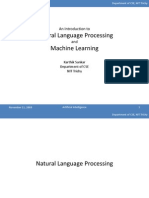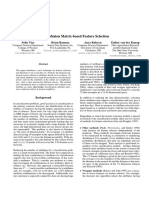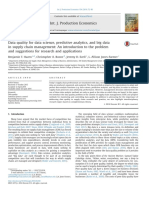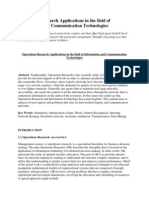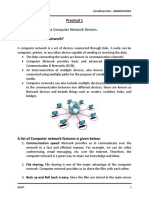Data Scientist Skills
Data Scientist Skills
Uploaded by
Ruksarat KhanankhoawCopyright:
Available Formats
Data Scientist Skills
Data Scientist Skills
Uploaded by
Ruksarat KhanankhoawOriginal Description:
Copyright
Available Formats
Share this document
Did you find this document useful?
Is this content inappropriate?
Copyright:
Available Formats
Data Scientist Skills
Data Scientist Skills
Uploaded by
Ruksarat KhanankhoawCopyright:
Available Formats
See discussions, stats, and author profiles for this publication at: https://www.researchgate.
net/publication/306095832
Data Scientist Skills
Article · April 2016
DOI: 10.9790/0050-03045261
CITATIONS READS
0 884
2 authors, including:
Wardah Zainal Abidin
UNIVERSITI TEKNOLOGI MALAYSIA
30 PUBLICATIONS 27 CITATIONS
SEE PROFILE
Some of the authors of this publication are also working on these related projects:
ePortfolio implementation Framework View project
All content following this page was uploaded by Wardah Zainal Abidin on 22 December 2016.
The user has requested enhancement of the downloaded file.
IOSR Journal of Mobile Computing & Application (IOSR-JMCA)
e-ISSN: 2394-0050, P-ISSN: 2394-0042.Volume 3, Issue 4 (Jul. - Aug. 2016), PP 52-61
www.iosrjournals.org
Data Scientist Skills
Nur Amie Ismail, Wardah Zainal Abidin
(Advance Informatics School, University of Technology Malaysia, Kuala Lumpur)
Abstract: Decision making is one of the most important aspects in order to enhance service delivery to citizens
and businesses, gain more profit, and help stakeholders to strategize their business functions. Nowadays, most of
the stakeholders make decisions based on the data that is precise, concise, appropriate, and accurate. Even though
Big Data Analytic (BDA) tools and software can assist in this matter, skills and competency of the personnel that
handle and manage the data is more crucial and important. Thus, the aim of this paper is to identify data scientist
skills from global best practices and examine the most important data scientist skills required by Information
Technology (IT) personnel. From our findings, we found 44 data scientist skills and the top 5 (five) skills are
business, statistic, machine learning, communication, and analysis.
Keywords: Data Science, Data Scientist, Data Scientist Skill
I. Introduction
Nowadays with the vast amounts of data available in the world, companies across industry are focusing
on exploiting data for their competitive advantage. Hence, they realized that they need to hire more data scientists
or equip their employees with data scientist skills. Data scientist is an expert who is capable to extract meaningful
value from the data and also manage the whole lifecycle of data [1]. Data scientists also help to bridge the
communication gap between business and IT functions, proposing meaningful measures, modelling the data,
visualizing the output, sharing the technique, and automating the process [2]. According to McKinsey Global
Institute, in United Stated of America (USA) alone, they need another 140 - 190 thousand of data scientist by
2018. Whereas in Malaysia, Multimedia Development Corperation (MDeC) have a set an ambitious target to
produce 1,500 data scientists by 2020. According to [3], currently in Malaysia there are only eighty (80) data
scientist across the country. In order to increase number of data scientist, various programs have been arranged
such as Big Data conference, trainings, certification, and Massive Open Online Courses (MOOC). However,
programs that have been arranged still insufficient to cater for meeting the ambitious target. Thus, this paper will
identify data scientist skills from global best practices and examine the most important data scientist skills required
by IT personnel in order to be recognized as Data Scientist.
This paper is organized as per following sequence. Section 2 explained review methodology that has
been used in this study. Section 3 briefly explained data science definition, data science fundamental concept, and
the difference between Data Scientist and Data Analyst. Section 4 discusses the data scientist skills from global
best practices followed by section 5 about finding. Finally, the conclusion and future works is in Section 6.
II. Review Methodology
To get clear and better understanding on the research topic, research review has been conducted from
various resources such as books, articles, journals, and web sites. List of computerized databases used in this paper
are Association for Computing Machinery (ACM) Digital Library, IEEE, Science Direct, Springer Link, Wiley
Online Library, ERIC, Gartner, and Google Scholar. The resources that are reviewed are within the period of 2011
to 2016. Fig. 1 below shows the review methodology that has been used in this paper:
Fig. 1: Research review methodology
DOI: 10.9790/0050-03045261 www.iosrjournals.org 52 | Page
Data Scientist Skills
III. Data Science Definition, Data Science Fundamental Concepts And Difference Between
Data Scientist And Data Analyst
3.1 Data Science Definition
There are several definitions of data scientists from several authors as listed in the table 1.
Table 1: Data Science Definitions
No. Definition
1 Set of fundamental principles that support and guide the principle extraction of information and
knowledge from data [4].
2 Data science is the study of the generalizable extraction of knowledge from data [5].
3 Data science is a combination of statistic, computer science, and information design [2].
From table 1, we can summarize that, data science is combination of field of study related to extraction and
transformation of data.
3.2 Data Science Fundamental Concepts
According to [2], the fundamental concept of data science is extracting useful knowledge from data to
solve business problems that can be treated systematically by following a process with reasonably well-defined
stages. Data-science results requires careful consideration of the context in which they will be used in the
relationship between the business problem and the analytics solution. This often can be decomposed into tractable
sub problems via the framework of analyzing expected value. IT can be used to find informative data items from
within a large body of data. Other than that, entities that are similar with respect to known features or attributes
often are similar with respect to unknown features or attributes, data might not generalize beyond the observed
data and to draw causal conclusions, an attention to the presence of confounding factors possibly unseen ones.
3.3 Difference Between Data Scientist And Data Analyst
According to [6], Data Analyst focus on the movement and interpretation of data, typically focus on the
past and present. Where Data Scientist focus on summarizing data and to provide forecasting based on pattern
identified from past and current data. [7] define and differentiate between Data Scientist and Data Analyst as
describe in table 2.
Table 2: Data Scientist vs Data Analyst
Data Scientist Data Analyst
Building statistical models that make decisions Writing custom queries to answer
based on data. Each decision can be hard, e.g. block complex business questions.
a page from rendering, or soft, e.g. assign a score for
the maliciousness of a page that is used by
downward systems or humans.
Conducting causality experiments that attempt to Conceiving and implementing new
attribute the root cause of an observed phenomenon. metrics on capturing previously
This can be done by designing A/B experiments or poorly understood parts of the
if A/B experiment is not possible apply business / product.
epidemiological approach to the problem.
Identifying new products or features that come from Addressing data quality issues, such
unlocking the value of data; being a thought leader as data gaps or biases in data
on the value of data. A good example of that is the acquisition. Working with the rest
product recommendations feature that Amazon first of engineering to instrument
made available to a mass audience. incremental new data acquisition.
IV. Data Scientist Skills
In order to explore the list of data scientist skills, this study has a global reach and perspective as well
includes the Malaysian public sector. Basically the data scientist incorporates advanced analytical approach using
sophisticated analytic and data visualization software or tools in order to discover patterns of the data. The data
scientist then will do data migration and integration, data cleaning, analyzing and deliver the outcomes. According
to [8], the data scientist must be able to write in different programming language such as Python, R, Java, Ruby,
Clojure, Matlab, Pig, and SQL. Other than that, the data scientist need to understand about Hive, Hadoop, and
Map Reduce. They also suggest that the data scientist must be familiar with Natural Language Processing (NLP),
machine learning, conceptual modelling, statistical analysis, predictive modelling, and hypothesis testing. Even
DOI: 10.9790/0050-03045261 www.iosrjournals.org 53 | Page
Data Scientist Skills
though the data scientist has to learn new skills as explained above, at least they should have the capabilities in
communication skills, querying the database, understand about business strategy, able to design simple prototype
for top management, and have good understanding in system architecture.
Educational data scientist is rarely sighted breed especially within business and government. In order to
tackle this scenario, we need to produce more graduates and also equip the employees with necessary skills in
data science. [2] suggest that the data scientist should have skills in data mining, data modelling, data visualization,
and machine learning. According to [9], the data scientist uses advanced analytics such as predictive analysis, data
visualization and modelling, and machine learning to predict what is going to happen in the future and give
recommendations to enhance existing business process. They also defines that the data scientist is a combination
of three(3) main fields which are computer science, statistics, and domain knowledge.
Fig. 2 shows the relationship and skills for each area.
Fig. 2:Data scientist skills (Ayankoya et al., 2014)
[5] emphasizes that machine learning is the most important skill and necessary for all data scientists. In
machine learning, the data scientist should master of all 3 class of skills as illustrated in table 3 as per below.
Other than machine learning, data scientist also required knowledge in text mining, markup language like XML,
mathematics, and artificial intelligence (AI).
Table 3: Three (3) class of skill in Machine Learning
No. Class Skills
1 Statistic Bayesian statistic and probability.
2 Computer Science Data structure, algorithm and distributed computer.
3 Correlation and Causation Modelling.
Data scientist is an expert that has the ability to manipulate and extract knowledge and turn it into
meaningful value [1]. According to their study, currently there is no accepted and effective data science
professional curriculum. [10] found that the two (2) top skills companies are looking for in a data scientist are
programming and statistical. The details of these two (2) skills illustrate in fig. 3.
Fig. 3: Programming and Statistics
According to [11], data science is now being benchmarked against practices that employed on highly
skilled professionals. Data Scientist uses scientific methods to discover knowledge and patterns of the data.
DOI: 10.9790/0050-03045261 www.iosrjournals.org 54 | Page
Data Scientist Skills
Fig. 4: The data science benefits-realization process(Viaene, 2013)
Fig. 4 illustrates on how to use data to improve the business. This process involves modelling,
discovering, operationalizing, and cultivating the knowledge. The data scientist must have a pretty good skill in
business domain, analysis, and communication. While, according to [12], data scientist is the sexist job in this
century. Sexy in the sense of having a rare quality in high demand. Data scientist is urgently needed by
organizations because they know how to use the analysis of big data to make effective decisions. Among the skill that
they should consider are programming language, computer science, mathematics, economics, probability, and business. In
the O’Reilly book, Analysing the Analysers by [13], they have made a survey over more than 200 data scientists
to discover and analyze what data skills needed by the data scientist. They found 22 generic skills shown in fig.
5.
Fig. 5: Data Scientist generic skills
Malaysia Public Sector have started their BDA project since 2014 led by MAMPU. Since data science is
still new in Malaysia, they do not have internal expertise in this area. Therefore, they have hired external
consultants to develop the project. Even though they use external parties; knowledge transfer, training, and
DOI: 10.9790/0050-03045261 www.iosrjournals.org 55 | Page
Data Scientist Skills
technology updates are given to Government IT officers. Soon, Malaysian Government do realize that the
importance of having internal expertise in this field. Hence, skills of data scientist are identified to enhance
Government IT officer competency and knowledge. According to [14], the skills that are required for data scientist
consist of model and analysis, data processing, statistic, business domain, soft skill, and technical skill as
illustrated in Fig. 6.
Fig. 6: Data scientist skill (Suhailis, 2016)
In 2013, [15] have announced the Digital Malaysia Roadmap, which encompasses a plan that addresses
three ICT areas which are to access, adoption and usage ICT services. One of the goals in the roadmap is to
improve Big Data literacies in Malaysia. Therefore, in October 2013, MDeC have conducted a survey to 17
experts in Big Data. The participants come from different background such as telecommunication company,
universities, marketing agency, software development companies, and others. Based on their survey, the top five
skills needed are:
(i) Big and Distributed Data (eg: Hadoop, MapReduce)
(ii) Algorithms (eg: computational complexity, CS theory)
(iii) Machine Learning (eg: decision trees, neural nets, SVM, clustering)
(iv) Back-End Programming (eg: JAVA/Rails/Objective C)
(v) Visualization (eg: statistical graphics, mapping, web-based dataviz)
In the last few years, the interest in data science field has soared. Most of the companies in USA are
seeking and recruiting employees who have skills related to data science. From the perspective of [16], she
emphasizes that the data scientist must have both technical skill and non-technical as listed in the table 4 below:
Table 4: List of skill needed to recruit employee in data science
No. Type of skill Skills
1 Technical Skills Analytics, SAS, R, Python, Coding, Hadoop, SQL, and Database.
2 Non-Technical Skills Intellectual curiosity, business acumen, and communication skills.
In United Kingdom, data science is among the most rapidly emerging field based on trend in ICT market.
The key to success in business nowadays is to understand customer’s preferences, needs, and behavior. Thus, data
scientist plays an important role to do a prediction and make decision in this particular area. [17] concludes that
data scientist need multi-faceted skills illustrated in fig. 7.
DOI: 10.9790/0050-03045261 www.iosrjournals.org 56 | Page
Data Scientist Skills
Fig. 7: Data Scientist Skills (Stadelmann et al., 2013)
In Japan, the Ministry of Education, Culture, Sports, Science, and Technology (MEXT) has initiated a
three-year project namely “Data Science Training Network” to develop the data scientists. This projects involves
various stakeholders such as from the universities, the industry, and the Government. The Government of Japan
realize that data science is an important area in order to increase their efficiency, generate more income, make
prediction, and assist in decision making. Based on finding by [18], the constraint of employer is to find talented
and highly skilled in data science. The result obtained from the first 12 months of the project revealed that to
become successful data scientist, the mandatory skills are:
(i) Deep analytics skills: Machine learning, database, and programming.
(ii) Service providing skills: Communication skills and business.
(iii) Service receiving skills: Decision making.
In India, a professional is well equipped with software and tools to assist and accomplish their tasks in
the office such Business Intelligence (BI) and expert system [19]. This software is widely used to help the
management to strategize their business vision and mission, learn from previous trend and pattern of data, and
also prevent damage and error. He also lists some of the skills required once the employee enter data science area.
The skills are R programming, Python, Java, Ruby, Hadoop, Analysis, Data Mining, Machine Learning, and
Statistic. Gartner, Inc. is an American research and advisory firm that provides ICT updates and best practices.
Basically, best practice is defined and provided by Gartner for the purpose of benefitting in terms of efficiency
optimization, reduce costs and risks, and enhance the effectiveness in the organization. Gartner has released an
article that explains the relationship between IT skill, domain understanding, and data science shown in fig.8.
According to [20], to avoid failure in Big Data project, team member must possess different skills through some
programs like training and hands-on that can extend their current experience.
Fig. 8: Big Data Analytics Skill Model (Gartner, 2015)
DOI: 10.9790/0050-03045261 www.iosrjournals.org 57 | Page
Data Scientist Skills
Creativity, leadership, common sense, passion, and curiosity equally important with the technical skills
and basically complimenting each other.
[21] reviews some of the skills required in order to become a data scientist. The most and top skill is
knowing business strategy and function of the organization. Usually, IT personnel can easily adapt and learn new
skills but lacking in term of aligning business with IT. Secondly they should know about the statistic. With some
statistical technique, problem can be classified, translated thus providing with the recommendations. Some of the
tools for statistic are R programming and SAS. Besides that, data scientist should have the capability to write in
different programming languages like Java, Python, C++, and C #. Other than having programming skills, mastery
in database also important. In database, they must know how to integrate, migrate, and load the data. Some of
emerging tools in database are Hadoop, Hive and Mahoot. Last but not least, visualization and communication
skills is important because it enables those who aren’t professional data analysts to interpret data.
[22] emphasized that data scientist is broadly applied within different organizations making it difficult
to provide a complete and non-controversial list of required skills. [22] suggested at high level, a data scientist
needs a mastery in data warehousing, data analysis, data transformation, and communication skills.
V. Findings And Discussion
From the research review, this study found 44 skills from18 papers which is includes technical and non-
technical skills as portray in Table 5. Whereas table 6 shown data scientist skills that categorized into five (5) IT
domain areas adapted from [17].
Table 5: Data Scientist Skills
No Skill Frequency Skills Appear in the papers Percentage (%)
1 Business 11 61.11
2 Statistic 10 55.56
3 Communication 9 50.00
4 Machine Learning 9 50.00
5 Analysis 8 44.44
6 Programming (General) 7 38.89
7 Data Modeling 5 27.78
8 Hadoop 5 27.78
9 Database (General) 4 22.22
10 Python 4 22.22
11 R Programming 4 22.22
12 Data Visualisation 3 16.67
13 Java 3 16.67
14 Mathematic 3 16.67
15 Natural Language Processing 3 16.67
16 SQL 3 16.67
17 Algorithm 2 11.11
18 Business Intelligence 2 11.11
19 Data Mining 2 11.11
20 Hive 2 11.11
21 Map reduce 2 11.11
22 Probability 2 11.11
23 SAS 2 11.11
24 Simulation 2 11.11
25 Other soft skills: 2 11.11
26 Artificial Intelligence 1 5.56
27 C/C++/C# 1 5.56
28 Clojure 1 5.56
29 Cloud computing 1 5.56
30 Computer Science 1 5.56
31 Data Manipulation 1 5.56
32 Data Transformation 1 5.56
33 Data Processing 1 5.56
34 Data warehousing 1 5.56
DOI: 10.9790/0050-03045261 www.iosrjournals.org 58 | Page
Data Scientist Skills
35 Decision making 1 5.56
36 Distributed System 1 5.56
37 Economic 1 5.56
38 Ethics 1 5.56
39 Mahoot 1 5.56
40 Matlab 1 5.56
41 Pig 1 5.56
42 Privacy and Security 1 5.56
43 Ruby 1 5.56
44 System architecture 1 5.56
Table 6: List of data scientist skill based on IT Domain Area
No. IT Domain Area Skills
1 Computer Science i. C/C++/C#
ii. Cloud computing
iii. Distributed System
iv. Java
v. Programming(general)
vi. Privacy and Security
vii. R Programming
viii. System architecture
ix. Clojure
x. Hadoop
xi. Mahout
xii. Pig
xiii. Python
2 Analytics i. Algorithm
ii. Artificial Intelligence
iii. Analysis
iv. Machine Learning
v. Mathematic
vi. Matlab
vii. Map reduce
viii. Natural Language Processing
ix. Probability
x. SAS
xi. Statistic
xii. Simulation
3 Data Management i. Business Intelligence
ii. Database
iii. Data Mining
iv. Data Manipulation
v. Data Modelling
vi. Data Visualization
vii. Data Transformation
viii. Data Processing
ix. Data Warehousing
x. SQL
xi. Hive
4 Art and Design i. Communication
ii. Decision making
iii. Ethics
5 Entrepreneurship i. Business
ii. Economic
DOI: 10.9790/0050-03045261 www.iosrjournals.org 59 | Page
Data Scientist Skills
VI. Conclusion
From analysis of this study, the top five (5) skills are business, statistic, machine learning,
communication, and analysis as shown in fig. 9.
Fig. 9: The top five (5) data scientist skill
Based on fig. 9, business has the highest percentage (61.11%) of frequency appeared among the papers.
The data scientist should understand their business objectives, environment, and strategies so that they know
where and how to maximize usage of data in the organization. The second highest is statistic (55.56%). Basically,
statistic is used to design and interpret experiments, build models, and make prediction. Then, machine learning
is in the third place (50.00%). Machine learning is a method of data analysis that automates analytical model
building. Machine learning allows computers to find hidden insights without being explicitly programmed where
to look. Other than technical skill, non-technical such as communication (50.00%) also the characteristics or skills
required in this field. This skill will assist the data scientist to understand stakeholders, to lead in decision making
process, and get retention. Finally, skill in analysis (44.44%). Out of 44 skills, other non-technical skills such as
economic and ethics also emphasized by some authors.
This study has aimed to identify data scientist skills from global best practices and examine the most
important data scientist skills required by IT personnel. As a conclusion, even though there are many skills
required by IT personnel in order to become a good data scientist, they have to make sure it is aligned with their
organization needs and purposes. For future work, we recommend other researchers to explore and develop full
set of data scientist curriculum. The curriculum will be a guideline and succession planning in order to prepare
experts in data science.
References
[1] Manieri, A., Demchenko, Y., Brewer, S., Hemmje, M., Riestra, R., & Frey, J. (2015). Data Science Professional uncovered How the
EDISON Project will contribute to a widely accepted profile for Data Scientists. In 2015 IEEE 7th International Conference on Cloud
Computing Technology and Science Data. doi:10.1109/CloudCom.2015.57
[2] Shum, S. B., Hall, W., Keynes, M., Baker, R. S. J., Behrens, J. T., Hawksey, M., & Jeffery, N. (2013). Educational Data Scientists :
A Scarce Breed. Retrieved from http://simon.buckinghamshum.net/wp-content/uploads/2013/03/LAK13Panel-Educ Data Scientists.
pdf
[3] Patrick, S. (2015). Malaysia needs 1,500 data scientists by 2020. Retrieved from http://www.thestar.com.my/tech/tech-
news/2015/04/24/data-scientists-needed-to-make-sense-of-the-numbers/
[4] Provost, F., & Fawcett, T. (2013). Data Science Its Relationship Data-Driven Decision Making, 1(1), 51–59.
doi:10.1089/big.2013.1508
[5] Dhar, V. (2013). Data Science and Prediction, 56. doi:10.1145/2500499
[6] Perumal, S. (2015). Data scientist. Retrieved from http://www.slideshare.net/SevugaPerumal1/a-free- orientation-on-statistical-data-
analysis-is-conducted-on-saturday-25072015-at-10-am-and-it- has-2-hours-duration
[7] Boulis, K. (2014). What is difference between a data analyst and a data scientist? Retrieved from https://www.quora.com/What-is-
difference-between-a-data-analyst-and-a-data-scientist
[8] Soumendra Mohanty, M. J. and H. S. (2013). Big Data Imperatives Enterprise Big Data Warehouse, BI Implementations and
Analytics. Apress.
[9] Ayankoya, K., Box, P. O., Calitz, A., Box, P. O., Greyling, J., & Box, P. O. (2014). Intrinsic Relations between Data Science , Big
Data , Business Analytics and Datafication, 192–198. doi:10.1145/2664591.2664619
[10] CrowdFlower. (2015). 2015 Data Scientist Report.
[11] Viaene, S. (2013). Data Scientists Aren’t Domain Experts. IEEE Compu ter Society.
[12] Patil, T. H. D. and D. . (2012). Data scientist the sexiest job of the 21st_century. Harvard Business Review.
[13] Harlan D. Harris, Sean Patrick Murphy, and M. V. (2013). Analyzing the Analyzers: An Intro Survey of Data Scientist and Their
Work. (M. Loukides, Ed.) (First Edit). United States of America: O’Reilly. Retrieved from
http://oreilly.com/catalog/errata.csp?isbn=9781449371760
[14] Suhailis, A. (2016). Garis Panduan Data Raya Sektor Awam.
[15] MDEC. (2014). Big Data in Malaysia : Emerging Sector Profile.
[16] Burtch, L. (2014). 9 Must-Have Skills You Need to Become a Data Scientist. Retrieved fromhttp://www.kdnuggets.com/2014/11/9-
must-have-skills-data-scientist.html
[17] Stadelmann, T., Stockinger, K., Braschler, M., Cieliebak, M., Baudinot, G., & Ruckstuhl, A. (2013).
[18] Applied Data Science in Europe Challenges for Academia in Keeping Up with a Highly Demanded Topic.
[19] Maruyama, H. (2013). Developing Data Analytics Skills in Japan : Status and Challenge, 1–6.
DOI: 10.9790/0050-03045261 www.iosrjournals.org 60 | Page
Data Scientist Skills
[20] Retrieved from https://datascientist.ism.ac.jp/
[21] Gehl, R. W. (2015). Sharing , knowledge management and big data : A partial genealogy of the data scientist.
doi:10.1177/1367549415577385
[22] Sicular, S. (2015). Big Data Analytics Failures and How to Prevent Them, 1(August).
[23] Rao, A. (2014). The 5 Dimensions of the So- Called Data Scientist.
[24] Polich, K. (2016). How to hire for the right big data skill set.
DOI: 10.9790/0050-03045261 www.iosrjournals.org 61 | Page
View publication stats
You might also like
- Sample - Core Java Developer Assessment - 1635359098862Document10 pagesSample - Core Java Developer Assessment - 1635359098862Shivansh Singh0% (1)
- Research Data StrategyDocument9 pagesResearch Data StrategyWael ChaabaneNo ratings yet
- Data+Science+Immersive+Bootcamp+Syllabus GalvanizeDocument7 pagesData+Science+Immersive+Bootcamp+Syllabus GalvanizelorNo ratings yet
- Introduction To Master Patient IndexDocument9 pagesIntroduction To Master Patient IndexNishant SharmaNo ratings yet
- Storage Huawei AllDocument268 pagesStorage Huawei AllНиколай ГалановNo ratings yet
- Kurzweil 250 Service ManualDocument230 pagesKurzweil 250 Service ManualaxmontiNo ratings yet
- Augmented Analytics Feb22 Rsallam 379393Document61 pagesAugmented Analytics Feb22 Rsallam 379393Foresight B.I. Solutions Inc.100% (1)
- Data Management Vs Data GovernanceDocument2 pagesData Management Vs Data GovernanceInternational Journal of Innovative Science and Research TechnologyNo ratings yet
- The Data Science Machine, or How To Engineer Feature Engineering'Document6 pagesThe Data Science Machine, or How To Engineer Feature Engineering'sanNo ratings yet
- Natural Language Processing and Machine Learning BasicsDocument36 pagesNatural Language Processing and Machine Learning BasicsKarthik SankarNo ratings yet
- What Tools Should A Data Scientist Know?: 12 AnswersDocument7 pagesWhat Tools Should A Data Scientist Know?: 12 AnswersDon AccentNo ratings yet
- 00 Big Data and Business Analytics - Trends, Platforms, Success Factors and ApplicationsDocument31 pages00 Big Data and Business Analytics - Trends, Platforms, Success Factors and ApplicationsFabella Rizky NaumiNo ratings yet
- How Big Data Is DifferentDocument4 pagesHow Big Data Is DifferentyoltorshuulNo ratings yet
- Career in Data Science Ultimate GuideDocument33 pagesCareer in Data Science Ultimate GuideAditya ManiarNo ratings yet
- Complete List of Data Science ResourcesDocument2 pagesComplete List of Data Science ResourcesDennis La CoteraNo ratings yet
- Confusion Matrix-Based Feature SelectionDocument8 pagesConfusion Matrix-Based Feature SelectionJuan SalvadorNo ratings yet
- Practical Data Science With RDocument1 pagePractical Data Science With RDreamtech Press33% (3)
- Data Quality and Data Cleaning: An OverviewDocument132 pagesData Quality and Data Cleaning: An Overviewpayalpatil0% (1)
- Business Analytics For Managers Taking Business Intelligence Beyond ReportingDocument19 pagesBusiness Analytics For Managers Taking Business Intelligence Beyond ReportingmustamuNo ratings yet
- Data Science For Business 2 PDFDocument40 pagesData Science For Business 2 PDFtisNo ratings yet
- Data LiteracyDocument54 pagesData LiteracyLeo PutraNo ratings yet
- BigDataAnalyticsDocument36 pagesBigDataAnalyticsdeepak1892100% (1)
- A Beginners Guide To Getting First Data Science Job PDFDocument64 pagesA Beginners Guide To Getting First Data Science Job PDFHerman669No ratings yet
- Data Mining in MedicineDocument42 pagesData Mining in MedicineAna-Maria RaileanuNo ratings yet
- Data Literacy PDFDocument123 pagesData Literacy PDFPaulo CruzNo ratings yet
- Data CleaningDocument19 pagesData CleaningJorge Isai Aleman Ortiz100% (2)
- The Ultimate Data Literacy Cheat SheetDocument2 pagesThe Ultimate Data Literacy Cheat SheetKai HirotaNo ratings yet
- PwC's Health Research Institute ReportDocument21 pagesPwC's Health Research Institute ReportHLMeditNo ratings yet
- DataScientist v2Document14 pagesDataScientist v2Hero NemoNo ratings yet
- Data Science: Career GuideDocument7 pagesData Science: Career GuidesunnyNo ratings yet
- Data Quality For Data Science in SCMDocument9 pagesData Quality For Data Science in SCMCallum BromleyNo ratings yet
- Introduction Data ScienceDocument23 pagesIntroduction Data ScienceSaad Awan100% (1)
- Data Mart V Data WarehouseDocument19 pagesData Mart V Data WarehouseAnil PatchaNo ratings yet
- Data Science Handbook SampleDocument4 pagesData Science Handbook Samplediana.yantiNo ratings yet
- Analytics in a Business Context: Practical guidance on establishing a fact-based cultureFrom EverandAnalytics in a Business Context: Practical guidance on establishing a fact-based cultureNo ratings yet
- M.Tech. Data Science & Engineering - Programme BrochureDocument18 pagesM.Tech. Data Science & Engineering - Programme Brochuresumodh100% (1)
- How To Think Like A Data ScientistDocument20 pagesHow To Think Like A Data ScientistReina Reyes100% (9)
- Tutorial - Build A Knowledge Graph Using NLP and Ontologies - Developer GuidesDocument28 pagesTutorial - Build A Knowledge Graph Using NLP and Ontologies - Developer GuidesSalton GerardNo ratings yet
- ch03 PowerpointsDocument35 pagesch03 PowerpointsBea May M. BelarminoNo ratings yet
- The Practice of Predictive Analytics in Healthcare - by Gopalakrishna PalemDocument27 pagesThe Practice of Predictive Analytics in Healthcare - by Gopalakrishna PalemGopalakrishna Palem100% (1)
- Data Science AcadgildDocument20 pagesData Science Acadgildpraneet singhNo ratings yet
- Operations Research Applications in The Field of Information and CommunicationDocument6 pagesOperations Research Applications in The Field of Information and CommunicationrushabhrakholiyaNo ratings yet
- Data Science Boot Camp Survival ManualDocument65 pagesData Science Boot Camp Survival ManualJoanna Reed100% (4)
- An Introduction To Data MiningDocument47 pagesAn Introduction To Data MiningPablo MoreteNo ratings yet
- Data Preprocessing - Data CleaningDocument29 pagesData Preprocessing - Data CleaningtierSarge100% (2)
- Data Model Scorecard - Article 2 of 11Document6 pagesData Model Scorecard - Article 2 of 11Analytics8No ratings yet
- Data Science For Business 3 PDFDocument28 pagesData Science For Business 3 PDFtisNo ratings yet
- Implementing Travel & Hospitality Data Mesh: AWS Reference ArchitectureDocument2 pagesImplementing Travel & Hospitality Data Mesh: AWS Reference ArchitecturePavan SavlaNo ratings yet
- Data Science Training in HyderabadDocument7 pagesData Science Training in HyderabadTanishsadan ANo ratings yet
- POL BigDataStatisticsJune2014Document27 pagesPOL BigDataStatisticsJune2014HHenry1860No ratings yet
- Anxiety - Secure TestDocument3 pagesAnxiety - Secure TestCristina T. ChengNo ratings yet
- Data Science Definitions Ebook PDFDocument30 pagesData Science Definitions Ebook PDFopticoNo ratings yet
- The State of Data Literacy 2023 PDFDocument59 pagesThe State of Data Literacy 2023 PDFpgr_chileNo ratings yet
- Data Scientist - KD PDFDocument1 pageData Scientist - KD PDFMichelle MenacheryNo ratings yet
- A Guide To Teaching Data Science PDFDocument26 pagesA Guide To Teaching Data Science PDFgasibuteaNo ratings yet
- Classification of Mushroom Fungi Using Machine LeaDocument8 pagesClassification of Mushroom Fungi Using Machine Leadhruvi kapadiaNo ratings yet
- 2011 ED03 Burbank Hoberman PDFDocument49 pages2011 ED03 Burbank Hoberman PDFAnonymous T72rxnTNo ratings yet
- Galaxy S20 - S20+ - S20 Ultra 5GDocument2 pagesGalaxy S20 - S20+ - S20 Ultra 5Gfarhan engineerNo ratings yet
- Micronet™ TMR 5009 Digital Control Operations Manual: Woodward Governor CompanyDocument202 pagesMicronet™ TMR 5009 Digital Control Operations Manual: Woodward Governor CompanyMenno AkkermanNo ratings yet
- Etiquette D'articles PDFDocument18 pagesEtiquette D'articles PDFNassim AIT-ALINo ratings yet
- MM 30032023Document41 pagesMM 30032023felipe eduardo gajardo muñozNo ratings yet
- Video: Hubspot Architecture I Practicum Discovery CallDocument9 pagesVideo: Hubspot Architecture I Practicum Discovery Callcamilo.salazarNo ratings yet
- MCS 032Document17 pagesMCS 032Mahitha KarunanNo ratings yet
- Chapter 3122Document27 pagesChapter 3122Haunted BhaîNo ratings yet
- Fighter DatasheetDocument4 pagesFighter Datasheetachraf conceptionNo ratings yet
- 109 - IOT and E Glove Based Nurse Calling SystemDocument7 pages109 - IOT and E Glove Based Nurse Calling SystemPavan Yashoda PkNo ratings yet
- Study of Unix & CommandsDocument16 pagesStudy of Unix & CommandsJameer Asif100% (1)
- Bio Inspired Networking: Prepared By: Kratika JaiswalDocument15 pagesBio Inspired Networking: Prepared By: Kratika JaiswaldarbarNo ratings yet
- Price List K-Galaxy Komputer - IT SupermarketDocument4 pagesPrice List K-Galaxy Komputer - IT Supermarketfaisol_476570463No ratings yet
- Running Machines: Arm Multiple ChoiceDocument4 pagesRunning Machines: Arm Multiple ChoicePoojaNo ratings yet
- Antivirus Solution Purchase ChecklistDocument1 pageAntivirus Solution Purchase ChecklistPrem BasnetNo ratings yet
- Pec 31 Acd MaterialDocument12 pagesPec 31 Acd MaterialsubburaviNo ratings yet
- Switching Circuits and Logic DesignsDocument4 pagesSwitching Circuits and Logic DesignsTrustWorthy100No ratings yet
- Iso 13400-1-2011Document22 pagesIso 13400-1-2011Adam KhanNo ratings yet
- Sample Thesis Format For Computer ScienceDocument8 pagesSample Thesis Format For Computer Scienceangelarobertswilmington100% (2)
- Operating System Cit333Document124 pagesOperating System Cit333Muhammad HamidNo ratings yet
- TOULOUSE 3 - Paul Sabatier University - Study Guide: UPS Techno Field Covered 0/1Document56 pagesTOULOUSE 3 - Paul Sabatier University - Study Guide: UPS Techno Field Covered 0/1Madhu MidhaNo ratings yet
- CN 1 - MergedDocument32 pagesCN 1 - MergedLo VeNo ratings yet
- Linux User & Developer 191 - Control ContainersDocument98 pagesLinux User & Developer 191 - Control ContainersLyc JeanNo ratings yet
- User'S Manual of Intel Q77/B75 Express Chipset Based: M/B For LGA 1155 Quad Core Ready Intel Core ProcessorDocument38 pagesUser'S Manual of Intel Q77/B75 Express Chipset Based: M/B For LGA 1155 Quad Core Ready Intel Core ProcessorRafael CostaNo ratings yet
- The Ultimate Penetration Testing Command Cheat Sheet For Kali LinuxDocument51 pagesThe Ultimate Penetration Testing Command Cheat Sheet For Kali LinuxJhony HidayatNo ratings yet
- Subledger Accounting (SLA) Configuration For OPM in R12Document46 pagesSubledger Accounting (SLA) Configuration For OPM in R12rishisingh149No ratings yet
- Ggplot2: Quick Correlation Matrix Heatmap - R Software and Data Visualization - Easy Guides - Wiki - STHDADocument7 pagesGgplot2: Quick Correlation Matrix Heatmap - R Software and Data Visualization - Easy Guides - Wiki - STHDACleaver BrightNo ratings yet
- BioStation User GuideDocument77 pagesBioStation User GuideHugo LoredoNo ratings yet










